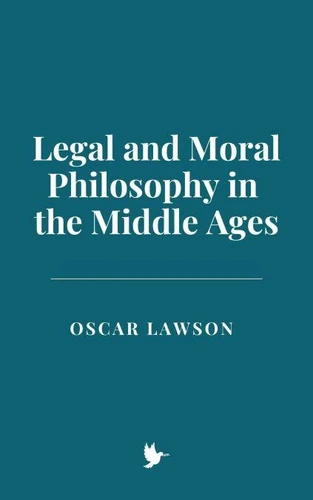Legal and Moral Philosophy in the Middle Ages
Par :Formats :
Disponible dans votre compte client Decitre ou Furet du Nord dès validation de votre commande. Le format ePub est :
- Compatible avec une lecture sur My Vivlio (smartphone, tablette, ordinateur)
- Compatible avec une lecture sur liseuses Vivlio
- Pour les liseuses autres que Vivlio, vous devez utiliser le logiciel Adobe Digital Edition. Non compatible avec la lecture sur les liseuses Kindle, Remarkable et Sony
 , qui est-ce ?
, qui est-ce ?Notre partenaire de plateforme de lecture numérique où vous retrouverez l'ensemble de vos ebooks gratuitement
Pour en savoir plus sur nos ebooks, consultez notre aide en ligne ici
- FormatePub
- ISBN8230923190
- EAN9798230923190
- Date de parution18/11/2024
- Protection num.pas de protection
- Infos supplémentairesepub
- ÉditeurIndependently Published
Résumé
This book explores the intricate interplay between legal and moral philosophy during the Middle Ages, spanning the period from the fall of the Roman Empire to the 14th century. It examines how religious, cultural, and intellectual developments shaped the foundational ideas of justice, law, and morality in a period marked by profound social and political transformations. The chapters delve into the contributions of key thinkers, including Augustine, Aquinas, Maimonides, and Duns Scotus, while also addressing the influence of Roman law, canon law, Islamic jurisprudence, and Jewish legal traditions.
The work situates medieval legal and moral philosophies within their historical contexts, tracing their evolution through pivotal events such as the Investiture Controversy, the rise of scholasticism, the Black Death, and the Great Schism. It explores how these philosophies grappled with universal principles like natural law, free will, and justice, while also adapting to the practical realities of feudalism, commerce, and societal crises.
Key themes include the moral dimensions of governance, the balance between authority and mercy, the ethical implications of economic life, and the enduring tension between individual conscience and institutional authority. The book also highlights the cross-cultural exchanges between Christian, Islamic, and Jewish traditions, emphasizing their mutual influence on medieval thought. By analyzing primary sources and the works of influential figures, this book provides a comprehensive and nuanced understanding of medieval legal and moral philosophy, illuminating its relevance for contemporary debates on law, ethics, and justice.
It bridges the historical with the philosophical, offering a richly detailed account of a transformative era in the intellectual history of the West.
The work situates medieval legal and moral philosophies within their historical contexts, tracing their evolution through pivotal events such as the Investiture Controversy, the rise of scholasticism, the Black Death, and the Great Schism. It explores how these philosophies grappled with universal principles like natural law, free will, and justice, while also adapting to the practical realities of feudalism, commerce, and societal crises.
Key themes include the moral dimensions of governance, the balance between authority and mercy, the ethical implications of economic life, and the enduring tension between individual conscience and institutional authority. The book also highlights the cross-cultural exchanges between Christian, Islamic, and Jewish traditions, emphasizing their mutual influence on medieval thought. By analyzing primary sources and the works of influential figures, this book provides a comprehensive and nuanced understanding of medieval legal and moral philosophy, illuminating its relevance for contemporary debates on law, ethics, and justice.
It bridges the historical with the philosophical, offering a richly detailed account of a transformative era in the intellectual history of the West.
This book explores the intricate interplay between legal and moral philosophy during the Middle Ages, spanning the period from the fall of the Roman Empire to the 14th century. It examines how religious, cultural, and intellectual developments shaped the foundational ideas of justice, law, and morality in a period marked by profound social and political transformations. The chapters delve into the contributions of key thinkers, including Augustine, Aquinas, Maimonides, and Duns Scotus, while also addressing the influence of Roman law, canon law, Islamic jurisprudence, and Jewish legal traditions.
The work situates medieval legal and moral philosophies within their historical contexts, tracing their evolution through pivotal events such as the Investiture Controversy, the rise of scholasticism, the Black Death, and the Great Schism. It explores how these philosophies grappled with universal principles like natural law, free will, and justice, while also adapting to the practical realities of feudalism, commerce, and societal crises.
Key themes include the moral dimensions of governance, the balance between authority and mercy, the ethical implications of economic life, and the enduring tension between individual conscience and institutional authority. The book also highlights the cross-cultural exchanges between Christian, Islamic, and Jewish traditions, emphasizing their mutual influence on medieval thought. By analyzing primary sources and the works of influential figures, this book provides a comprehensive and nuanced understanding of medieval legal and moral philosophy, illuminating its relevance for contemporary debates on law, ethics, and justice.
It bridges the historical with the philosophical, offering a richly detailed account of a transformative era in the intellectual history of the West.
The work situates medieval legal and moral philosophies within their historical contexts, tracing their evolution through pivotal events such as the Investiture Controversy, the rise of scholasticism, the Black Death, and the Great Schism. It explores how these philosophies grappled with universal principles like natural law, free will, and justice, while also adapting to the practical realities of feudalism, commerce, and societal crises.
Key themes include the moral dimensions of governance, the balance between authority and mercy, the ethical implications of economic life, and the enduring tension between individual conscience and institutional authority. The book also highlights the cross-cultural exchanges between Christian, Islamic, and Jewish traditions, emphasizing their mutual influence on medieval thought. By analyzing primary sources and the works of influential figures, this book provides a comprehensive and nuanced understanding of medieval legal and moral philosophy, illuminating its relevance for contemporary debates on law, ethics, and justice.
It bridges the historical with the philosophical, offering a richly detailed account of a transformative era in the intellectual history of the West.


















